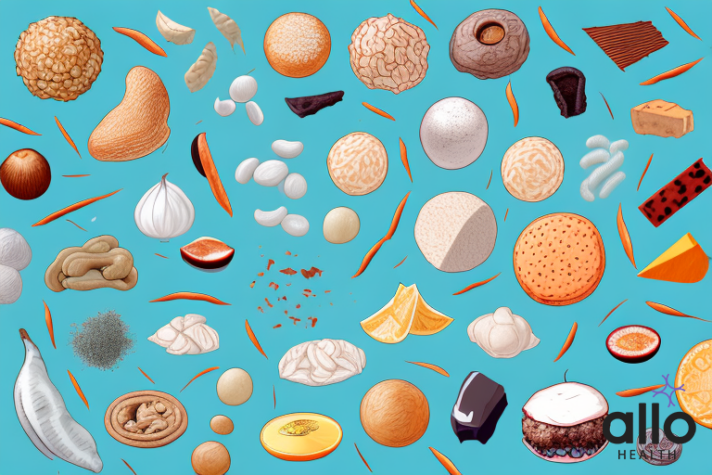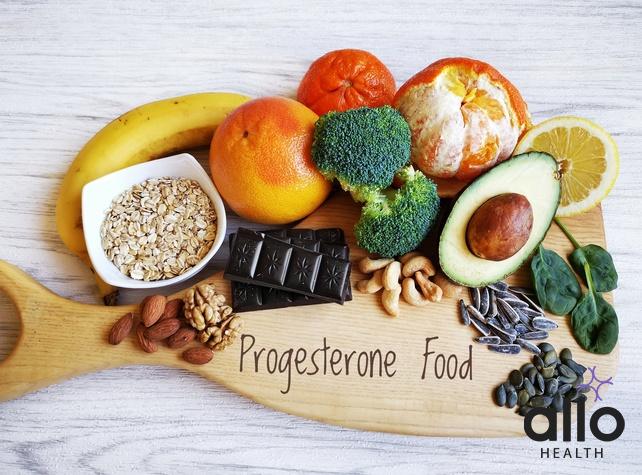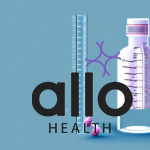What Are Some Progesterone Rich Foods?

Allo Health is dedicated to personalized well-being, offering support and trusted information tailored to individual health goals. The platform emphasizes human-generated content, led by a distinguished medical team of experts, including physicians and sexual health specialists. Their commitment to credibility involves rigorous fact-checking, authoritative research, and continuous updates to ensure accurate, up-to-date information. Allo Health's unique approach goes beyond conventional platforms, providing expert-led insights and a continuous commitment to excellence, with user feedback playing a crucial role in shaping the platform's authoritative voice.

Dr Sanina Mansoor holds MBBS degree from Yenepoya university,Mangalore.She has 8 years of experience working as a medical officer at various health centres and medical colleges.
Why This Was Upated?
Our experts continually monitor the health and wellness space, and we update our articles when new information became available.
Updated on 23 January, 2024
- Article was updated as part of our commitment to diversity, equity, and inclusion.

"The following blog article discusses food and diet-related information for general educational purposes. However, it is important to note that the information provided is not intended as personalized dietary advice and should not be considered a substitute for professional guidance from a registered dietitian or qualified healthcare professional. Before making any significant changes to your diet or nutrition plan, it is recommended to consult with a registered dietitian or healthcare professional.
Book consultation
Dietary changes can have a significant impact on your overall health and well-being. It is important to approach any changes to your diet in a balanced and sustainable manner, ensuring that you meet your nutritional needs and avoid any potential nutrient deficiencies. Rapid or extreme changes in dietary patterns can be detrimental to your health and may require professional guidance.
It is crucial to note that any specific dietary recommendations or guidelines mentioned in this article may not be appropriate for individuals with specific medical conditions, allergies, or intolerances. A registered dietitian or healthcare professional can provide individualized advice, including modifications or alternative food choices to accommodate your unique circumstances.
The information provided in this article may not encompass all possible dietary considerations or account for the latest research and nutritional guidelines."
Are you looking for an all-natural way to balance your hormones and improve your overall health? Look no further than your own plate! Incorporating progesterone rich foods into your diet can help regulate your hormone levels and alleviate symptoms of hormonal imbalance, such as irregular periods, mood swings, and infertility.
What is Progesterone?
Progesterone is a hormone that plays a crucial role in the female reproductive system. It is produced mainly in the ovaries by the corpus luteum, a temporary endocrine gland that forms after ovulation. Small amounts of progesterone are also produced by the adrenal glands.
Progesterone is a type of steroid hormone and belongs to the class of hormones known as progestogens. It is one of the primary hormones involved in the menstrual cycle, pregnancy, and the development and maintenance of the uterine lining.
Functions of Progesterone
- Menstrual Cycle: Progesterone works in coordination with estrogen to regulate the menstrual cycle. During the menstrual cycle, progesterone levels rise after ovulation, preparing the uterus for possible pregnancy by thickening the uterine lining (endometrium). If fertilization and implantation of an embryo occur, progesterone continues to be produced to maintain the pregnancy.
- Pregnancy: Progesterone plays a critical role in supporting and maintaining pregnancy. After fertilization, the embryo implants itself into the uterine lining, and progesterone helps to create a suitable environment for implantation and supports the early development of the placenta. It also prevents the uterus from contracting prematurely, which could lead to a miscarriage.
- Uterine Lining: Progesterone helps to maintain the thickened uterine lining during the second half of the menstrual cycle. If pregnancy does not occur, progesterone levels decline, triggering the shedding of the uterine lining during menstruation.
- Breast Development: Progesterone stimulates the growth and development of the milk-producing glands in the breasts during pregnancy, preparing them for lactation.
- Other Functions: Progesterone also has various effects on other tissues in the body, including the brain, bones, and cardiovascular system. It affects mood, thermoregulation, and can have a sedative effect. It also influences bone density and has a role in maintaining cardiovascular health.
Medical Uses of Progesterone
- Hormone Replacement Therapy (HRT): Progesterone, in combination with estrogen, is used in hormone replacement therapy for women who experience menopausal symptoms. It helps protect the uterus from the increased risk of uterine cancer associated with estrogen therapy alone.
- Contraception: Progesterone or synthetic progestins are used in various forms of hormonal contraception, such as birth control pills, patches, injections, and intrauterine devices (IUDs). Progestin-only pills are also available.
- Assisted Reproductive Technologies: Progesterone supplementation is often used during in vitro fertilization (IVF) and other assisted reproductive technologies to support the uterine lining and improve the chances of successful implantation.
- Menstrual Irregularities: Progesterone may be prescribed to regulate menstrual cycles in cases of irregular or absent periods.
How Does Progesterone Affect Your Body?
Progesterone affects the body in several ways due to its role as a crucial hormone in the female reproductive system. Here are the detailed effects of progesterone on various body systems:
Reproductive System
- Uterine Lining: Progesterone stimulates the growth and maintenance of the endometrium (the uterine lining) during the menstrual cycle. It helps prepare the uterus for possible pregnancy by promoting the thickening of the endometrium, making it more receptive to embryo implantation.
- Menstruation: If pregnancy does not occur, progesterone levels decline, leading to the shedding of the uterine lining during menstruation.
- Pregnancy Support: Progesterone is vital for establishing and maintaining pregnancy. It helps prevent the uterus from contracting, supports the development of the placenta, and promotes a suitable environment for fetal growth.
Breasts
- Breast Development: Progesterone contributes to the growth and development of the milk-producing glands (alveoli) in the breasts during pregnancy.
- Milk Production: After childbirth, progesterone levels decrease, allowing prolactin (another hormone) to initiate milk production in the mammary glands.
Central Nervous System
- Mood Regulation: Progesterone can influence mood and emotional well-being. Fluctuations in progesterone levels throughout the menstrual cycle may contribute to premenstrual syndrome (PMS) symptoms, including mood swings and irritability.
- Sedative Effect: Progesterone has a calming and sedative effect on the central nervous system, which may cause drowsiness or relaxation.
Metabolism and Temperature Regulation
- Metabolic Effects: Progesterone can affect metabolism and energy expenditure, potentially leading to changes in appetite and weight.
- Thermoregulation: Progesterone may influence body temperature, and during the luteal phase of the menstrual cycle, body temperature tends to increase slightly.
Cardiovascular System
- Blood Vessel Relaxation: Progesterone has a vasodilatory effect, meaning it relaxes the smooth muscles in blood vessel walls, which can lead to a slight drop in blood pressure.
- Fluid Retention: Progesterone can cause fluid retention, which may contribute to bloating or mild edema.
Other Effects
- Bone Health: Progesterone plays a role in maintaining bone density and has a protective effect against osteoporosis.
- Skin: Progesterone receptors are present in the skin, and the hormone may affect skin health and appearance.
The Role of Progesterone in Pregnancy and Fertility
Progesterone plays a crucial role in pregnancy and fertility, as it is responsible for preparing and maintaining the uterus for successful implantation and supporting the growth and development of the embryo/fetus. Here’s a detailed explanation of progesterone’s role in pregnancy and fertility:
Ovulation and Fertilization
- During the menstrual cycle, progesterone levels remain relatively low during the follicular phase, which is the first half of the cycle. This allows the follicles in the ovaries to develop and mature.
- After ovulation occurs, the ruptured follicle forms the corpus luteum, a temporary endocrine gland that secretes progesterone.
- Progesterone levels rise during the luteal phase of the menstrual cycle, preparing the uterus for potential pregnancy.
Preparing the Uterus for Implantation
- Progesterone helps to prepare the uterine lining (endometrium) for the implantation of a fertilized egg. It promotes the growth and thickening of the endometrium, making it more receptive to embryo implantation.
- Progesterone also stimulates the secretion of uterine glandular fluid, which provides a nourishing environment for the embryo.
Supporting Early Pregnancy
- If fertilization occurs, the fertilized egg implants itself into the thickened endometrium.
- Progesterone continues to be produced by the corpus luteum, ensuring the survival and development of the early embryo.
- It helps to maintain the uterine lining, preventing it from shedding during menstruation and supporting the implantation process.
Maintaining Pregnancy
- Around the 7th to 9th week of pregnancy, the placenta starts to develop and gradually takes over the production of progesterone.
- Progesterone secreted by the placenta is vital for the maintenance of pregnancy. It supports the growth and development of the placenta, facilitates nutrient and oxygen supply to the fetus, and helps prevent premature contractions of the uterus.
- Progesterone also plays a role in immune modulation during pregnancy, preventing the mother’s immune system from rejecting the developing fetus.
Progesterone Supplementation
- In some cases of infertility or assisted reproductive technologies (e.g., in vitro fertilization or IVF), progesterone supplementation may be necessary.
- Progesterone supplements can help support the uterine lining and create an optimal environment for embryo implantation and early pregnancy.
Pregnancy Outcome
- Progesterone levels remain elevated throughout pregnancy, reaching their peak in the third trimester.
- The hormone continues to play a vital role in maintaining the uterine environment, supporting fetal growth and development, and preparing the body for labor and childbirth.
How a Balanced Diet Can Help Regulate Progesterone Levels
Maintaining a balanced diet can contribute to the regulation of progesterone levels in the body. While diet alone may not directly increase or decrease progesterone production, it can support overall hormonal balance and optimize the body’s ability to produce and utilize progesterone. Here are some ways a balanced diet can help regulate progesterone levels:
Nutrient Adequacy
- Consuming a well-balanced diet ensures an adequate intake of essential nutrients that support hormonal health. Key nutrients for hormone production and balance include B vitamins (especially vitamin B6), magnesium, zinc, and vitamin C.
- Vitamin B6 is particularly important for progesterone production as it is involved in the enzymatic reactions necessary for its synthesis.
- Including a variety of fruits, vegetables, whole grains, lean proteins, and healthy fats can help ensure nutrient adequacy.
Healthy Fats
- Healthy fats are crucial for hormone production and balance, including progesterone.
- Incorporate sources of healthy fats such as avocados, nuts and seeds, olive oil, coconut oil, and fatty fish like salmon.
- Omega-3 fatty acids, found in fatty fish, flaxseeds, and walnuts, are especially beneficial for hormonal health.
Fiber-Rich Foods
- Consuming an adequate amount of dietary fiber helps regulate blood sugar levels and supports overall hormonal balance.
- Include a variety of fiber-rich foods like fruits, vegetables, whole grains, legumes, and seeds.
- High-fiber foods can help prevent blood sugar spikes and insulin resistance, which can negatively impact hormone balance.
Antioxidant-Rich Foods
- Antioxidants protect the body against oxidative stress, which can disrupt hormonal balance.
- Include a wide range of colorful fruits and vegetables, which are rich in antioxidants.
- Berries, leafy greens, cruciferous vegetables (broccoli, cauliflower), and citrus fruits are excellent choices.
Phytoestrogens
- Some plant-based compounds, known as phytoestrogens, have estrogenic effects in the body and may indirectly influence progesterone levels.
- Include foods containing phytoestrogens, such as soy products (tofu, tempeh), flaxseeds, sesame seeds, and legumes.
- These foods should be consumed in moderation and as part of a balanced diet.
Limiting Processed Foods and Excessive Sugar
- High intake of processed foods, refined carbohydrates, and added sugars can disrupt hormonal balance and contribute to insulin resistance.
- Opt for whole, unprocessed foods and limit sugary beverages, sweets, and processed snacks.
Adequate Protein Intake
- Consuming an adequate amount of protein supports overall hormone production and balance.
- Include lean sources of protein such as poultry, fish, legumes, and tofu in your diet.
Hydration
- Staying adequately hydrated supports overall health and helps maintain proper hormonal balance.
- Aim to drink sufficient water throughout the day.
The Benefits of Including Progesterone-Rich Foods in Your Diet
Progesterone-rich foods do not exist naturally because progesterone is a hormone primarily produced by the human body. There are certain foods that contain nutrients or compounds that support progesterone production or hormonal balance. Including these foods in your diet can have indirect benefits for progesterone levels and overall hormonal health. Here are some of the potential benefits of including progesterone-supportive foods in your diet:
- Vitamin B6-Rich Foods:
- Vitamin B6 is involved in the synthesis of progesterone, and an adequate intake of this vitamin is essential for its production.
- Foods rich in vitamin B6 include salmon, chicken, turkey, bananas, avocados, potatoes, spinach, and sunflower seeds.
- Consuming these foods can support progesterone production indirectly by providing the necessary nutrients for its synthesis.
- Zinc-Rich Foods:
- Zinc is an essential mineral for hormone production and balance, including progesterone.
- Foods rich in zinc include oysters, beef, lamb, pumpkin seeds, sesame seeds, lentils, and spinach.
- Adequate zinc intake supports overall hormonal health, potentially including progesterone production.
- Magnesium-Rich Foods:
- Magnesium plays a vital role in hormone regulation and can indirectly support progesterone balance.
- Foods rich in magnesium include leafy greens (spinach, kale), nuts and seeds (almonds, pumpkin seeds), legumes, whole grains, and dark chocolate.
- Adequate magnesium intake helps support overall hormonal balance and may indirectly contribute to optimal progesterone levels.
- Healthy Fats:
- Including sources of healthy fats in your diet can support hormone production and balance, which can indirectly influence progesterone levels.
- Foods rich in healthy fats include avocados, nuts and seeds, olive oil, coconut oil, fatty fish (salmon, sardines), and grass-fed butter.
- Healthy fats provide the building blocks for hormone synthesis and support overall hormonal health.
- Antioxidant-Rich Foods:
- Antioxidants protect the body against oxidative stress and inflammation, which can disrupt hormonal balance.
- Including antioxidant-rich foods in your diet supports overall hormonal health and can indirectly promote optimal progesterone levels.
- Examples of antioxidant-rich foods include berries, citrus fruits, leafy greens, cruciferous vegetables, colorful fruits and vegetables, and green tea.
- Fiber-Rich Foods:
- Consuming an adequate amount of dietary fiber supports overall hormonal balance and can have positive effects on progesterone levels indirectly.
- Fiber-rich foods include fruits, vegetables, whole grains, legumes, and seeds.
- A diet high in fiber helps regulate blood sugar levels and supports stable hormone production.
Progesterone is primarily produced by the human body and is not naturally present in vegetables, fruits, dairy products, or herbs and spices. There are certain foods that contain nutrients or compounds that support hormonal balance and can indirectly benefit progesterone production or regulation. Here are lists of nutrient-rich foods from each category that support hormonal health:
Top 10 Vegetables for Hormonal Health
- Broccoli
- Brussels sprouts
- Spinach
- Kale
- Cauliflower
- Sweet potatoes
- Bell peppers
- Asparagus
- Cabbage
- Swiss chard
Top 10 Fruits for Hormonal Health
- Berries (such as strawberries, blueberries, and raspberries)
- Citrus fruits (such as oranges, lemons, and grapefruits)
- Apples
- Pears
- Avocados
- Papaya
- Kiwi
- Pineapple
- Pomegranate
- Mango
Top 10 Dairy Products for Hormonal Health
- Plain Greek yogurt
- Cottage cheese
- Kefir
- Skim milk
- Ricotta cheese
- Mozzarella cheese
- Goat cheese
- Feta cheese
- Quark
- Parmesan cheese
Top 10 Herbs and Spices for Hormonal Health
- Turmeric
- Cinnamon
- Ginger
- Garlic
- Oregano
- Rosemary
- Thyme
- Basil
- Sage
- Parsley
Precautions and Side Effects of Consuming High Amounts of Progesterone-Rich Foods
Since progesterone-rich foods do not naturally exist, consuming high amounts of progesterone-rich foods is not a concern. Consuming excessive amounts of certain foods or supplements that may affect hormone balance can have potential side effects or interactions. Here are some precautions and side effects to consider:
- Hormonal Imbalances: While a balanced diet is crucial for hormonal health, excessive consumption of certain nutrients or compounds can disrupt hormone balance. Maintain moderation and avoid extreme dietary practices.
- Individual Sensitivities: Some individuals may have sensitivities or allergies to certain foods. It’s important to be aware of any adverse reactions or allergies you may have and adjust your diet accordingly.
- Interactions with Medications: Certain foods or supplements can interact with medications, including hormonal treatments or medications. If you are taking any medications, consult with your healthcare provider or pharmacist to ensure there are no potential interactions.
- Digestive Discomfort: Excessive intake of certain foods, such as fiber-rich foods or spices, may cause digestive discomfort or gastrointestinal concerns in some individuals. It’s important to listen to your body and consume these foods in moderation.
- Blood Sugar and Weight Management: Some foods, particularly those high in sugars or refined carbohydrates, can affect blood sugar levels and potentially impact weight management. Balance your overall diet and consider portion sizes.
- Personalized Considerations: Each person’s dietary needs and health conditions are unique. Factors such as pregnancy, breastfeeding, specific medical conditions, or individual nutritional requirements may require personalized dietary guidance. Consulting with a healthcare professional or registered dietitian can provide tailored recommendations.
Frequently Asked Questions
(1) What are some examples of progesterone-rich foods?
Progesterone is a hormone primarily produced by the human body, and there are no foods that naturally contain progesterone. Certain foods can support hormone balance and indirectly benefit progesterone production. These include vitamin B6-rich foods like salmon and spinach, zinc-rich foods like oysters and lentils, magnesium-rich foods like leafy greens and nuts, and foods with healthy fats like avocados and fatty fish.
(2) Can consuming progesterone-rich foods increase my body’s progesterone levels?
Progesterone-rich foods do not directly increase progesterone levels since progesterone is primarily produced internally. A balanced diet that includes nutrient-dense foods can support overall hormonal health and indirectly contribute to optimal progesterone levels.
(3) Are there any side effects of consuming too many progesterone-rich foods?
Consuming a variety of nutrient-rich foods in moderation typically does not pose any significant side effects. Maintain a balanced diet and avoid excessive intake of specific nutrients or compounds. Additionally, individual sensitivities or allergies to certain foods should be taken into consideration.
(4) Can progesterone-rich foods help with hormonal imbalances?
While progesterone-rich foods cannot directly resolve hormonal imbalances, a well-rounded diet that includes nutrient-rich foods can support overall hormone balance. Consult with a healthcare professional for personalized guidance if you suspect a hormonal imbalance.
It is one of the primary hormones the ovary produces, the other being estrogen.” “Women with low progesterone levels experience irregular periods, low libido, anxiety, waking up at night, bone loss and fibrocystic breast (painful, lumpy breasts).
Progesterone-rich foods should be part of a balanced diet that includes a variety of nutrient-dense foods. While these foods can support hormonal health, they are just one aspect of maintaining overall well-being. It is recommended to adopt a holistic approach that includes lifestyle factors, stress management, and, if needed, professional medical guidance for hormone balance.







































